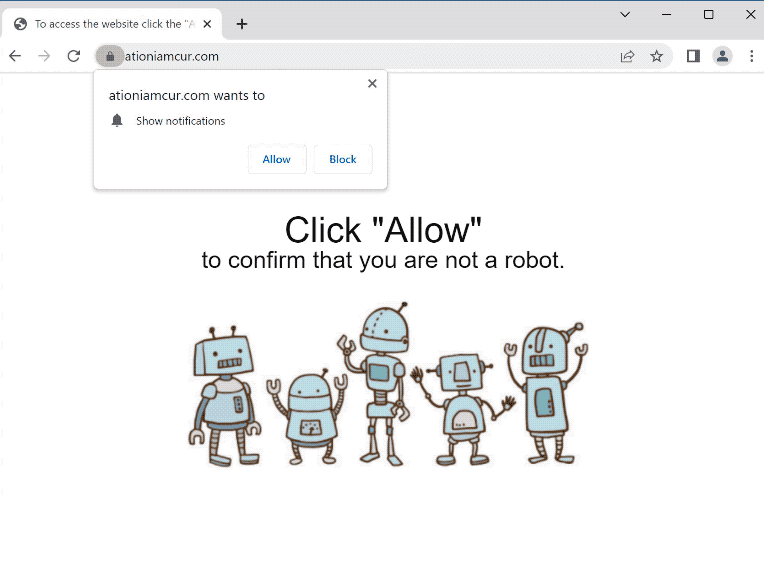ationiamcur.com is a generic scam website that intends to trick users into allowing ads on their desktops. To do this, it misuses a legitimate browser feature that allows sites to request permission to show notifications. But instead of any kind of useful content, ationiamcur.com shows ads. Thus, we do not recommend allowing ationiamcur.com to show notifications.
ationiamcur.com has no actual content on it, just a prompt asking you to click “Allow” if you’re not a robot. After being redirected to it, a browser alert will immediately pop up asking for permission to show notifications. Although this feature is legitimate, ationiamcur.com abuses it to spam ads on users’ screens. Unlike legitimate sites, ationiamcur.com does not show any useful content in its notifications.
Clicking on notifications generated by ationiamcur.com is not recommended, as they may lead to questionable or malicious websites promoting scams or hiding malware. If you’ve allowed ationiamcur.com to show notifications, it’s crucial to revoke this permission as soon as possible. Instructions to help do that are provided at the end of this report.
Why are you redirected to sites like ationiamcur.com
Redirects to websites such as ationiamcur.com are typically triggered by the websites that users visit. Many websites, particularly those with pirated or adult content, try to spam users with as many ads as possible. That includes redirects. They bombard users with ads and trigger redirects regardless of what users click on. Fortunately, these redirects can be easily blocked with any decent adblocker program.
Redirects to ationiamcur.com could also indicate an adware infection on your computer. Adware, browser hijackers, and similar infections are inadvertently installed by users through a method known as software bundling. These infections come bundled with popular free programs as additional offerings and are set to be installed alongside the associated programs automatically.
Additional offers are always optional, and users simply need to deselect them. However, this can be challenging because the offers are concealed in settings that users typically do not use. This is why software bundling is considered to be a rather deceptive installation method. However, as long as you are attentive when installing free programs, you should not encounter any issues with unwanted installations.
When installing a program, be sure to select Advanced (Custom) settings instead of Default (Basic). Although the installation window recommends using Default settings, keep in mind that Default settings hide all additional offerings and enable their automatic installation.
Advanced or Custom settings not only reveal the additional offers but also provide the option to deselect the ones you do not want. While some offers may initially seem useful, it is not advisable to allow their installation, as it can quickly clutter a computer with unnecessary junk. Legitimate programs do not use software bundling for installation due to the controversial nature of this method. Programs that do so are often identified as potential threats by anti-virus programs. Allowing these installations will only fill your computer with useless junk, which can be difficult to remove once fully installed. It’s much easier to deselect a couple of boxes when installing programs.
How do I stop ationiamcur.com notifications?
It’s a good idea to scan your computer with an anti-virus program to check for an adware infection, especially if you’re redirected regularly. Adware can be difficult to remove manually so using an anti-virus program is recommended. It’s also a good idea to install an adblocker program to block redirects and other advertisement content, especially when you visit ad-heavy sites.
If ationiamcur.com has permission to show you notifications, you can easily revoke it in your browser’s settings. In case you need assistance navigating the settings, you can use the below-provided instructions. You can also turn off the notification requests altogether if you don’t plan on using this feature at all.
If you have given the site permission to show notifications, here’s how to revoke it:
- Mozilla Firefox: Open the menu (the three bars at the top-right corner), click Options, then Privacy & Security. Scroll down to Permissions, press Settings next to Notifications, and remove ationiamcur.com and any other questionable websites from the list. It’s possible to permanently turn off push notification requests by checking the “Block new requests asking to allow notifications” box in the same Notifications settings.
- Google Chrome: Open the menu (the three dots top-right corner), then Settings, then Privacy and security, then Site Settings. Click on Notifications under Permissions, and remove ationiamcur.com and any other questionable websites from the list. It’s possible to permanently turn off push notification requests by toggling off “Sites can ask to send notifications”.
- Microsoft Edge: Open the menu (the three dots top-right corner), then Settings, then Cookies and site permissions, then Notifications. Review which sites have permission and remove ationiamcur.com and any other questionable websites from the list. It’s possible to permanently turn off push notification requests by toggling off “Ask before sending”.
Site Disclaimer
2-remove-virus.com is not sponsored, owned, affiliated, or linked to malware developers or distributors that are referenced in this article. The article does not promote or endorse any type of malware. We aim at providing useful information that will help computer users to detect and eliminate the unwanted malicious programs from their computers. This can be done manually by following the instructions presented in the article or automatically by implementing the suggested anti-malware tools.
The article is only meant to be used for educational purposes. If you follow the instructions given in the article, you agree to be contracted by the disclaimer. We do not guarantee that the artcile will present you with a solution that removes the malign threats completely. Malware changes constantly, which is why, in some cases, it may be difficult to clean the computer fully by using only the manual removal instructions.
